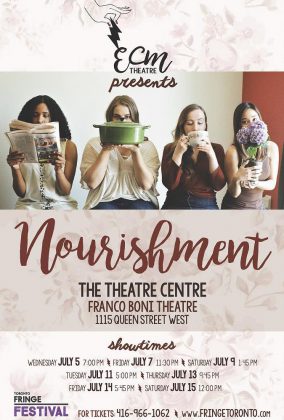
From July 5th to 16th, the Toronto Fringe Festival will bring new productions to theatres, public squares, restaurants and bars throughout Toronto in one of the most important theatrical festivals in Canada.
Although performers from the Peterborough community have been involved in the Fringe Festival before, this year Peterborough is well represented in the festival with local favuorites Adam Martignetti, Erin Maxfield, and Wyatt Lamoureux being featured in productions making their debut at Fringe next month.
Adam will be appearing in Pillow Talk, a show he developed with Peterborough native Olivia Brodie-Dinsdale and Charlotte Catell at The Theatre Passe Muraille. Erin is directing Nourishment, a show she developed with colleagues Jessica Watkin and Gloria Mok at the Franco Boni Theatre. Wyatt will be directing his newest play, Algonquin Highway, at the Al Green Theatre
The Fringe Festival finds its roots in Edinburgh, Scotland when eight uninvited theatre companies showed up at the Edinburgh International Festival in 1947 and proceeded to perform their shows at small venues, while the larger productions took over the traditional theatre spaces. Since then, the Edinburgh Fringe Festival has become one of the largest festivals in the world and has spawned similar franchises across the globe.
The Toronto Fringe Festival began in 1989 to support independent theatre that, at that time, didn’t get much exposure when competing with the giant Canadian theatre companies.
“The Fringe Festival is an excellent jumping off point for people who have new ideas and that they want to share with the world,” says Wyatt. “Having just come out of theatre school, as someone who moved from the west coast to Ontario at that time, I can attest to how locked in theatre was. If they didn’t know you, forget about it.
“There were people who wanted to do new things, but there were very few theatres to do those things in. It was all the traditional theatres — Stratford, Shaw and all the bigger theatres in Toronto.”
The Toronto Fringe Festival chooses its productions as part of a lottery picked at random. This year, over 500 theatre companies submitted entries for the festival, but only 75 companies were chosen. Fourteen theatres are involved hosting the various productions throughout Toronto, with other shows being featured in bars, restaurant, and other public spaces.

I had the great thrill of sitting next to Wyatt at The Theatre On King during a performance the night the lottery was held in Toronto, and was among the first to congratulate him when he received the notice his application for the Toronto Fringe Festival had been drawn. Algonquin Highway will be the first time that Wyatt has ever presented a show in Toronto.
“Algonquin Highway is about relationships, about love, and about preconceptions and prejudice,” Wyatt says. “It’s about two people, Alex and Nicky, who haven’t seen each other for five years. They grew up in a big city, went to elementary school together, high school together, went to college together, and one became an actor and another became a techie. And both just happen to be lesbians.
“Out of the blue, one gets a job to go out with a travelling company, and that’s the last time they see each other. After five years, Nicky calls Alex and wants to get together. So Alex drives to a small city two hours north of the GTA only to find out that her old girlfriend is now Nick, a transgender man. They have all the standard emotional drama to work their way through to find who they were before. It’s a test of friendship.”
Although Wyatt’s company, which is made up of stage manager Eryn Lidster and set designer Ian Burns, are from Peterborough, Algonquin Highway was a show Wyatt discovered he had to do in Toronto to find the right performers.
“Nick is a transgender man and Alex is an indigenous lesbian,” Wyatt explains. “So I decided really early that if I could not find those actors, I wouldn’t be doing this play. I did auditions in Peterborough, but nobody contacted me. So I went to Toronto and I found the actors — Smith Purdy and Haley Vincent — and they’re really good.
“In the plays I’ve written in the last ten years, I feel the shows I’ve been writing have challenged audience preconceptions of the characters. My characters are transgender and indigenous, because I want those audience members who have those preconceptions to layer that on top of what they are watching, and then have that eroded.”
As for Adam’s production Pillow Talk, he and his co-stars created their show with the help of director Connor Thompson and stage manager Justine Cargo through improvisation, developed from their affiliation with the Second City Conservatory Program.

“In the Second City program there is a strong emphasis on writing through improvisation,” Adam says. “We didn’t plan initially plan anything, but together Olivia, Charlotte and I came up with our ideas and wanted to see what we came up with through our scenes.
“It turns out that a lot of the scenes that we came up with — although they were all different from each other — all shared a central theme, in which we’d have conversations dealing with fears that we have, or anxieties that we’ve had over the years, and things like that.
“That’s where the idea of the title, Pillow Talk, came from. It’s not a sexual connotation like it’s normally used. We came up with an idea that pillow talk is a very intimate kind of conversation where you talk about something with someone that you’d normally not talk about publicly.
“It’s an opportunity for us to share with the audience, and each other, these very real experiences that we’ve had and situations where we can make people laugh, but also make people think and hopefully make people feel.”
For Nourishment, Erin worked with two of her former theatrical colleagues from the University of Guelph.
“When I won the Fringe lottery in November, I immediately got in touch with Jessica and Gloria because I had worked with them in university and I knew that I wanted to start a project with them,” says Erin.
“We knew we wanted to explore stories about women, whether they be fictional or historical, and we started to do research and throwing out stuff on the drawing board. A lot of it came from our own personal experiences about women in our own lives, and family members that we love that helped shape us into the women that we are.

“Once we had enough material we started going through it and looking for through lines found in all of our writing and we found that we were really exploring family dynamics, but not typical ones like mother and daughter, but the relationships that we had with our aunts or people who were not blood related but married into the family, or our grandparents and our cousins. We thought that was unique because those are stories that don’t always get explored a lot.”
However, Nourishment has another element to it beyond the family dynamic.
“We had this other through line which was about the ways in which women gather together,” Erin continues. “Some of this was based on the French salons of the 1800s which was more high-class women who were otherwise excluded from discussing politics and world issues. They were not allowed to do that because their world was male dominated, but they’d gather on their own and teach each other.
“We wanted to find a way to modernize that, because the French salons are not very relatable to all of us. There are so many places where women gather in our own society, like women-only gyms or self-defense classes or hair salons or the kitchen. It may be used as a joke sometimes, but the kitchen can be a very sacred and safe place for women to gather.”
Nourishment features actresses Kira Renee, Catherine Wylee, Grace Thompson, and Isabel Kanaan who perform framing sequences of four women — a grandmother, two cousins, and an aunt by marriage — within a kitchen, as well as scenes where the women perform other sequences featuring women in other situations. With Erin acting as director, her co-writer Jessica Watkins is the show’s choreographer and her other co-writer Gloria Mok is the lighting designer.
With the Toronto Fringe Festival only weeks away, the anticipation has created excitement throughout the Toronto theatre community.
“The Fringe Festival coordinators really try to build the community of artists before the productions go up,” Erin notes. “In my experience, the community is just there. There are hundreds of volunteers to put this festival together. It’s hard not to get caught up in it all, and just to want to be a part of the whole thing.”
While the Fringe Festival attracts people from all over Canada, how much of an impact is Peterborough making on the festival, as well as the Toronto theatre scene itself?
Our local community is already aware of the talent that our city has, and we have seen local performers such as Kate Suhr and Beau Dixon make huge inroads into the Toronto theatre community. According to Adam, people in Toronto are starting to notice Peterborough’s contribution to the Ontario theatre community.
“When I first started coming to Toronto and became part of the community here, the conversation would go: ‘So Adam, where are you from?’ I’d say ‘I’m from Peterborough.’ The answer I’d usually get is ‘Isn’t that where Trent University is?’ or ‘That’s where I stop for gas on the way to my cottage.’ That’s all people knew about Peterborough.
“But now people say “Oh, so you must know this person I worked with because they are from Peterborough.” We’re now becoming more and more part of the Toronto community in a major way. Peterborough is producing very talented people who are coming into Toronto, which is the closest place where they can have a very significant impact.”
Erin, who has lived and worked in Toronto for a number of years, has also recognized the subtle impact that Peterborough is making on Toronto.
“Peterborough is rich with this culture of artists and I think it’s been a great breeding ground. When people are looking for bigger things and want to take it to another level and make a career out of it, it’s easy to move to Toronto. I’m constantly crossing paths with people from Peterborough.”
The Toronto Fringe Festival runs from July 5th to 16th. For more information, including ticket information and the dates and times of the individual performances of Pillow Talk, Nourishment, and Algonquin Highway, visit the Toronto Fringe Festival website at fringetoronto.com.
For local theatre fans who want to hit up all three shows, mark Friday, July 14th on your calendar. This is the only date when all three shows will be performed on the same day, with Algonquin Highway at 12:30 p.m., Nourishment at 5:45 p.m., and Pillow Talk at 9:15 p.m. It’s a great way to support Peterborough performers in a different environment far beyond our local theatres.


























